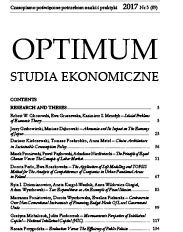Abenomics and Its Impact on The Economy of Japan
Abenomics and Its Impact on The Economy of Japan
Author(s): Jerzy Grabowiecki, Mariusz DąbrowskiSubject(s): Economy, National Economy
Published by: Wydawnictwo Uniwersytetu w Białymstoku
Keywords: abenomics; deflation; economic policy; GDP Japan; monetary policy; Tankan;
Summary/Abstract: Japanese economy is one of the largest economies in the world, but its share in the global GDP is decreasing steadily. Relative weakness is caused by both internal and external factors. Internal factors derive from a socio-economic model that was successful after World War II, but became less effective in the 21st century. On the other hand, external factors include: the growing competition from China and South Korea (the countries that initially emulated the Japanese model) and also the impact of natural disasters, which after several decades of relative seismic calm, have increasingly begun to affect the weakened economy of the Land of the Rising Sun. In addition, companies of the Silicon Valley have emerged on the market. When the software era arrived, Japan was still stuck to the production of hardware. In the face of the aforementioned challenges, successive governments in Tokyo have tried to break the unfavorable trend, which usually ended up with growing the public debt only. At the turn of 2012 and 2013 Shinzō Abe, an experienced politician, became the head of the Japanese government and announced a reform program named after his name – abenomics. The purpose of this article is the attempt to evaluate this program from the perspective of over four years from the time of its announcement.
Journal: Optimum. Economic Studies
- Issue Year: 89/2017
- Issue No: 5
- Page Range: 23-35
- Page Count: 13
- Language: English

